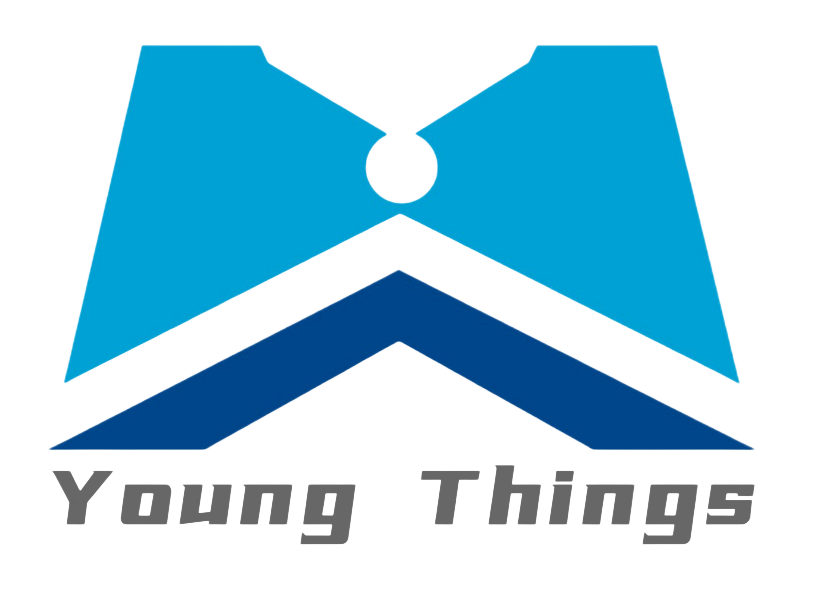Today, let’s talk about how to figure out whether your supplier is a genuine factory or just a trading company. I understand that finding a reliable, direct source isn't always easy, especially since many trading companies claim to be manufacturers just to earn your trust. Therefore, today, I’m going to guide you step-by-step on how to verify if your supplier is actually a factory. So, let’s get started!
Step 1: Determine Whether the Supplier is a Factory, Dealer, or Trading Company
The first step is to identify whether your supplier is a factory, distributor, or trading company. One of the simplest ways to begin is by using maps to check their actual location. You can use Google Maps or Gaode (China’s version of Google Maps) and enter the supplier’s company name (preferably their Chinese name—ask them for it and copy-paste). Once you have the address, check where it is located. If the address shows an office building or a commercial plaza, chances are, it’s not a factory but a trading company. Real factories are generally situated in industrial parks or standalone buildings with larger facilities. Here’s how to do it:
- Open Google Maps or Gaode,
- Enter the supplier’s name, and
- See where the location pops up. If it shows an office suite, it’s likely a trading company.


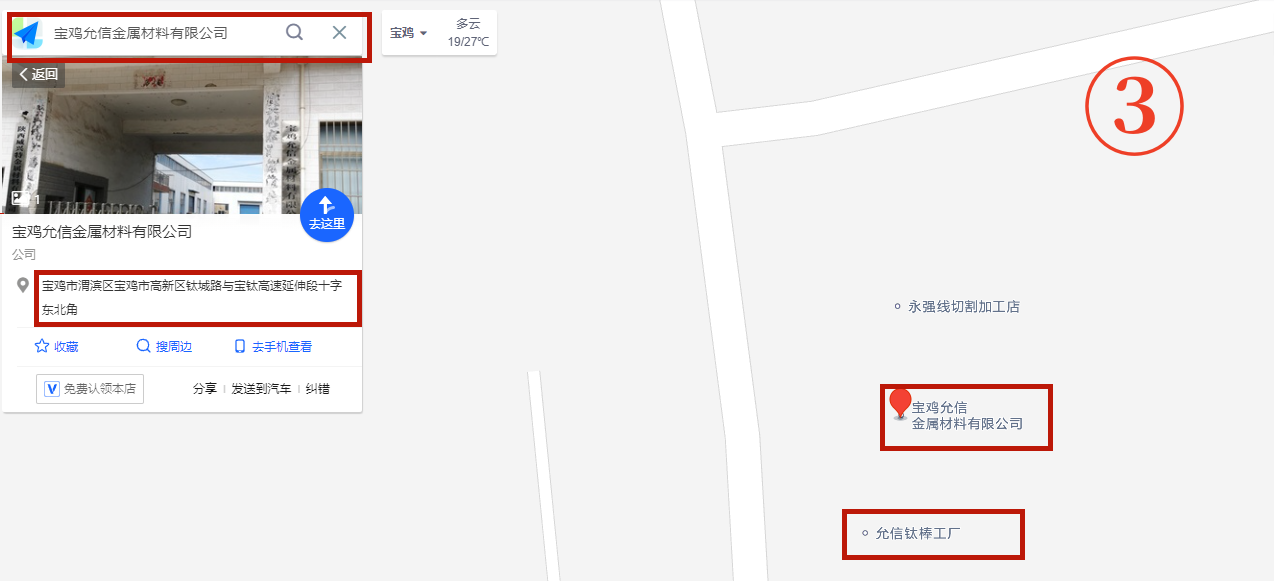
Tip:If you need any help, feel free to reach out. I can assist you regardless of the industry.
Step 2: Check their business license and focus on the scope of business The business license is your best friend here. It can quickly tell you if the company is a manufacturer. Genuine manufacturing companies will have words like "production," "processing," or "manufacturing" listed in the business scope. If you only see phrases like "import-export trade," but no mention of production, you’re probably dealing with a trading company.
Of course, there can be exceptions. Sometimes, a trading company is backed by a factory. To check, you can ask for the business licenses of both the trading company and the factory and compare them. You can also use platforms like Qichacha (a Chinese business directory) to dig into their shareholder relationships, which gives you a better idea of the company's structure. 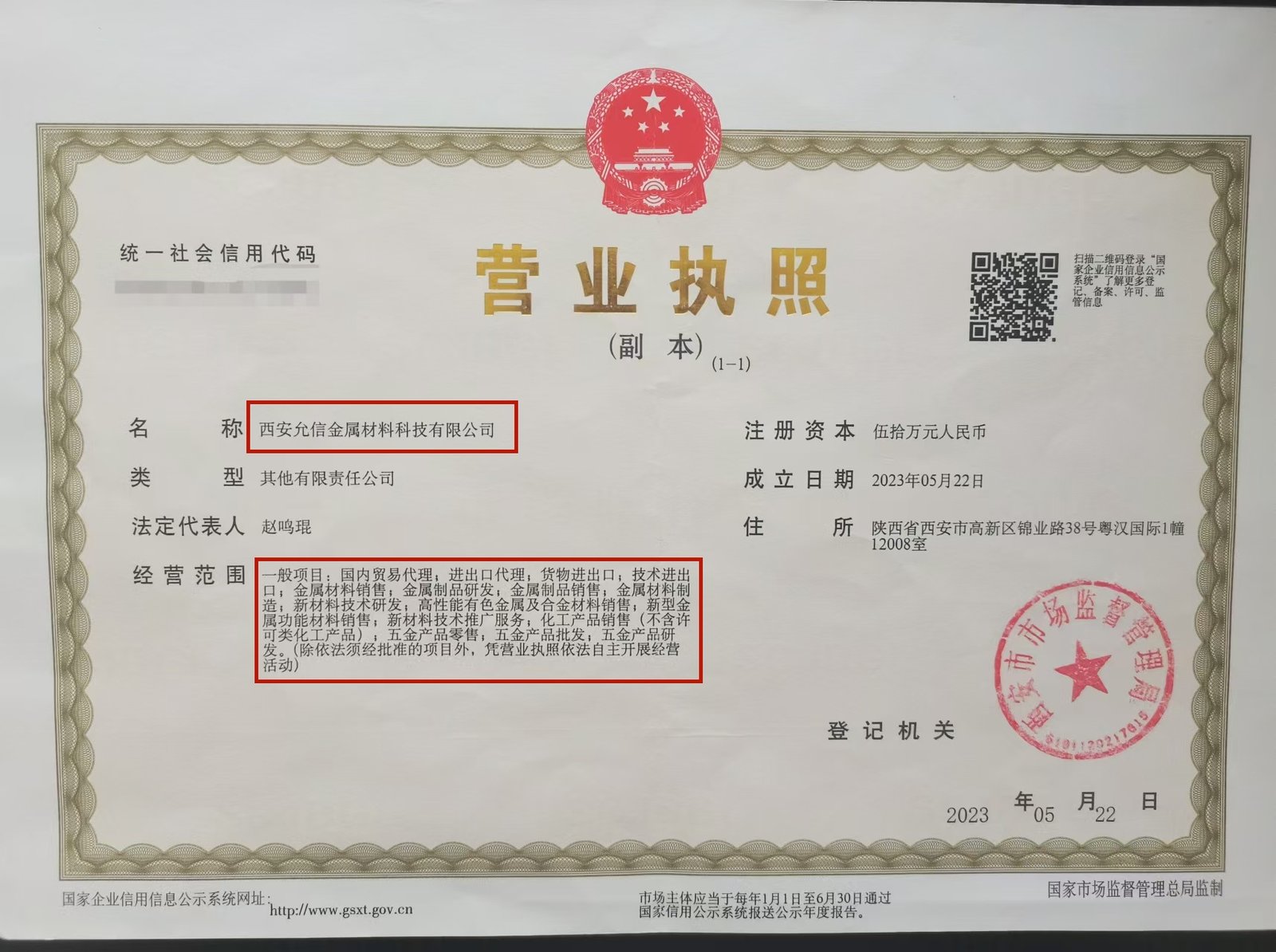
Quick tip: Don’t put too much weight on the registered capital. In China, it’s quite easy to register a company with a high capital amount. This doesn’t mean the company actually has that much money—it’s often just a way to make the company seem more powerful than it really is.
Let me walk you through a real example using our company. First, go to this website: https://aiqicha.baidu.com. (If you can’t sign in,you can contact me)Once you're there, enter the supplier’s name you want to verify (it's best to get their Chinese name and just copy-paste it). For example, our company's Chinese name is "西安允信金属材料科技有限公司" (Young Things Material Co., Ltd.)
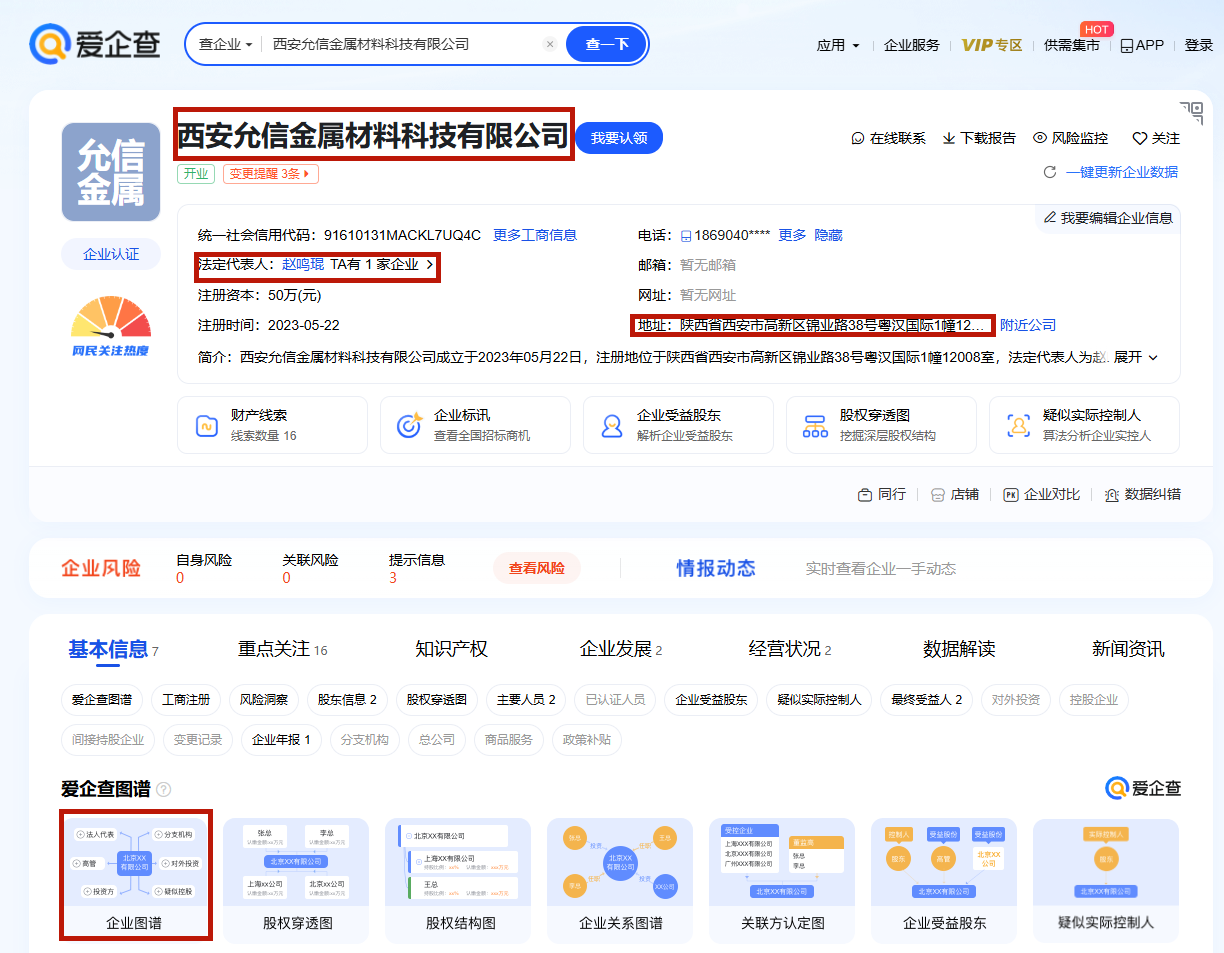
Next, here’s what you should focus on: first, check if the legal representative matches what's on the business license, and if the address lines up. Then, the most important thing is to look at the "Corporate Chart" in the bottom left corner. This is key—it shows if the supplier is backed by a factory.
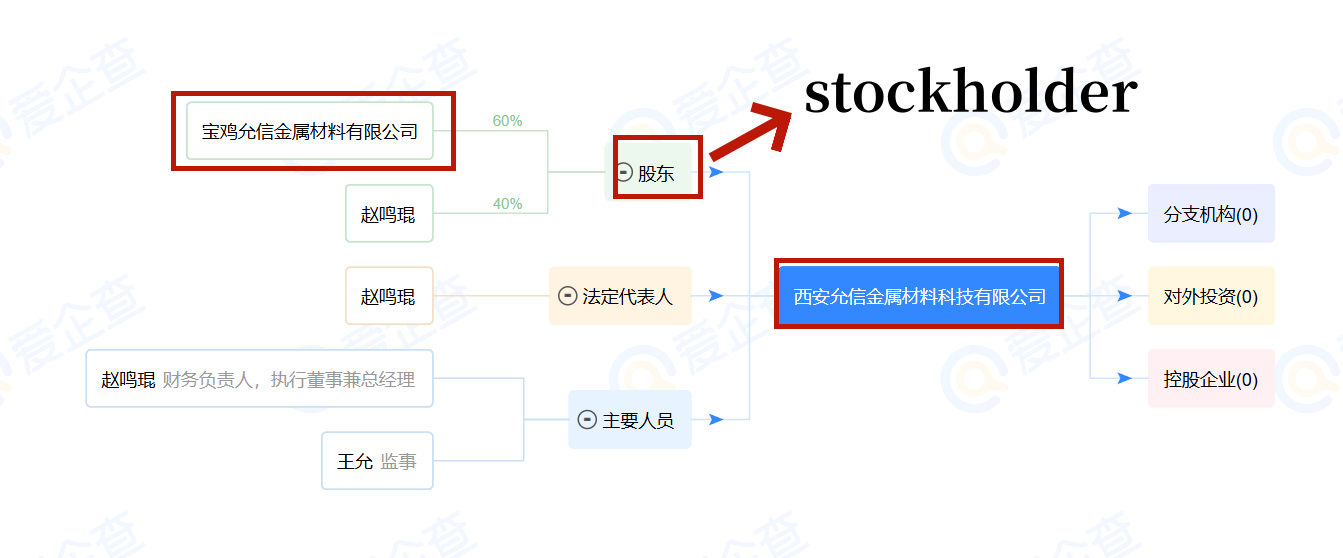
In our case, you'll see that our company is backed by "Baoji Yunxin Metal Materials Co., Ltd." Now, we need to verify whether this company is actually a real factory. Ask the supplier for the business license of the holding company and check if the name matches. Also, make sure the business scope includes words like “生产”、“加工”或者“制造.
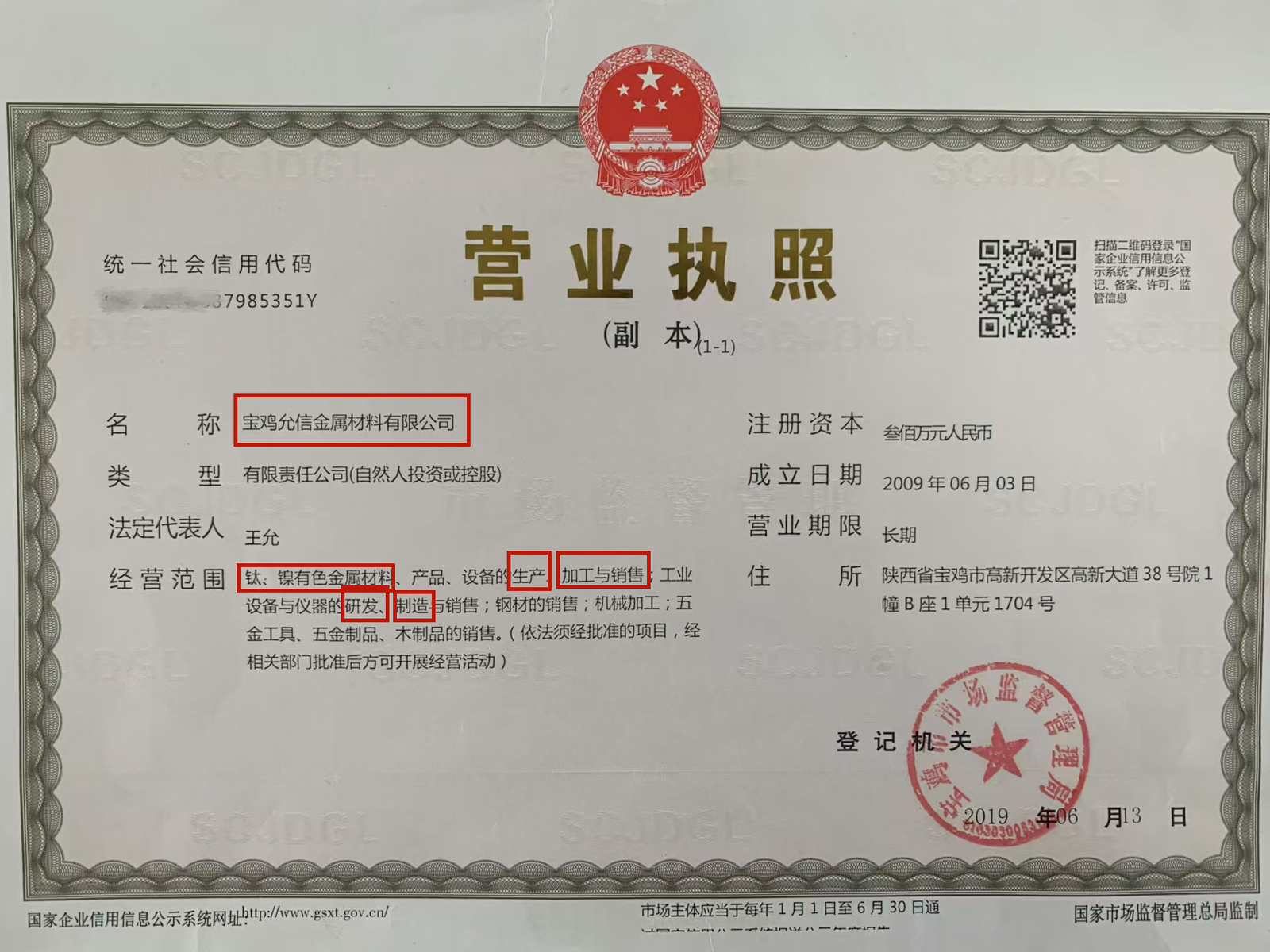
Clearly, this is a legitimate factory. By going directly to the factory, you can bypass the middlemen and ensure you’re getting the best price and highest quality titanium products.
One more tip: you can also use the company’s establishment year as a reference. If the company has been operating for almost 10 years and is still going strong, there’s a 99% chance it's a real factory. Longevity in the industry usually signals stability and reliability.
Breaking it down like this makes the process much easier to follow, doesn’t it?
Step 3: Analyze Their Product Range and Specialization
The next step, which is crucial in your verification process, is to carefully examine their product range. A genuine factory typically focuses on producing one or a few types of products—they specialize in certain areas. On the other hand, if your supplier offers a wide variety of unrelated products, this is a major red flag, indicating they might be a trading company. To investigate further, you can check their website to review the products they offer. The more scattered the product range is, the less likely it is that they are a factory.
Furthermore, you can strengthen your assessment by directly asking questions that only a real factory would have precise answers to, such as:
- How many workshops do you have?
- How many production lines are there in each workshop?
- Is each line dedicated to a specific product, or do they handle multiple products?
- What is your daily or monthly production capacity?
The responses to these questions will provide you with more clarity about whether they are genuinely a factory.
Step 4: Check Their Social Media and Factory Photos
Another important step in verifying a supplier’s legitimacy is by thoroughly reviewing their social media accounts and company website. A real factory will often take pride in showcasing their production workshops, machinery, and production lines in great detail. However, if you notice that their website features numerous photos of equipment, but lacks clear images of the actual factory exterior, this should raise concerns. This discrepancy could be a red flag. It may indicate they are using borrowed or stock photos. They might be trying to create a false impression of legitimacy. This could suggest they are not as genuine as they claim to be.
In contrast, a genuine manufacturer will not hesitate to openly display their facilities from multiple angles—both inside and outside. This level of transparency and openness is a strong indicator of trustworthiness and reliability, helping you feel more confident about their authenticity.
Step 5: Visit the Factory in Person, If Possible
While the above steps will help you narrow down your options and filter out unreliable suppliers, nothing compares to visiting the factory in person. If you have the time and resources, this is undoubtedly the best way to observe their operations firsthand, check their equipment, and meet their team. An on-site visit will give you the clearest picture of their production capabilities and ensure their claims align with reality.
If an in-person visit is not feasible, however, there’s a great alternative—request a video call tour. Many suppliers are now open to this option, allowing you to see the production lines and workshops in real-time through video.
Conclusion
In conclusion, by diligently following these five steps, you’ll be well-equipped. You can confidently determine whether your supplier is a genuine factory or merely a trading company. As a procurement professional, mastering these crucial skills is key. It helps you save both time and money. It also allows you to build stronger and more reliable partnerships over time. By accurately identifying the source factory, you can bypass the middlemen. This secures better prices while fostering direct relationships with the manufacturer. Ultimately, it leads to long-term success.
That’s all for today—straightforward and practical advice that you can start applying immediately! I truly hope that this guide will make the supplier verification process much clearer and easier for you to navigate. As always, stay tuned for next time, where I’ll be guiding you through how to effectively visit and inspect a factory, giving you even deeper insights into ensuring you’re working with the right supplier. In the meantime, I encourage you to try out these strategies, and if any questions arise, don’t hesitate to reach out to me for further assistance. I look forward to hearing how your efforts go and to supporting your journey to success!
Share this article
Written by : 钛合金网
Follow us
Table Of Content
